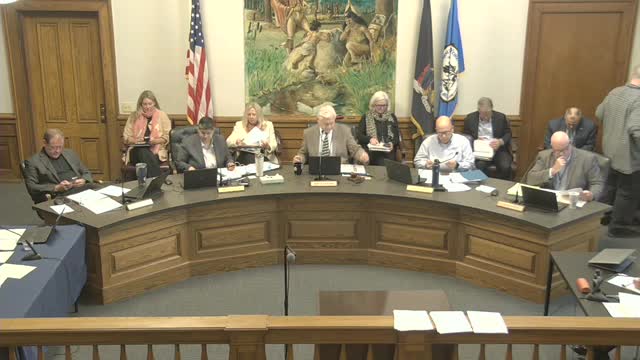Saratoga Springs finance commissioner presents conservative 2026 budget; recommends occupancy-tax money for senior center
Get AI-powered insights, summaries, and transcripts
Subscribe
Summary
At a public hearing on Oct. 21, the city’s finance commissioner outlined a conservative $61.37 million comprehensive 2026 budget, citing steep increases in retirement, health and liability costs. After public comment, the commissioner recommended using newly authorized occupancy-tax revenue to restore senior-center funding cut in the draft budget.
The city’s finance commissioner presented the 2026 comprehensive budget at a public hearing on Oct. 21, telling residents the draft is conservative because it was prepared before several revenue sources — including an occupancy tax and the city’s short-term-rental registry — were available.
The presentation said the comprehensive budget totals $61,370,000 and that most revenue is non–property-tax (primarily sales tax), with property tax providing about 30 percent of total revenues. The commissioner said personnel costs and benefits account for roughly 84 percent of the budget and left little room for discretionary spending.
The commissioner told the council and about two dozen public speakers that the city has seen sharp cost increases: retirement costs rose from about $4 million to $8 million, an 86 percent increase overall and a roughly $1.2 million increase from 2025 to 2026; health-insurance costs rose from $7.8 million to $9.9 million (27 percent); and liability insurance rose from about $834,000 to $2.4 million (188 percent). Capital costs also rose sharply, the presentation said, noting an ambulance that cost $180,000 in 2019 would cost about $587,000 in 2025.
To limit the budget’s impact on taxpayers, the draft includes a recommended 2 percent property-tax levy increase. The presenter said the 2 percent increase would equal $14.66 per $100,000 of assessed value for residents in the inside district (about $14.88 for outside-district properties). The draft also proposes using $1.5 million of the city’s fund balance.
The presentation listed options to close the gap, including extending paid parking (proposed April 1–Nov. 1 rather than Memorial Day–Labor Day), raising the levy to 4.53 percent (the commissioner noted that remains within the statutory cap), removing a 2.25 percent early-payment discount for taxpayers, reassessment, fee increases, reducing overtime and legal fees, and creating a community preservation transfer tax on real-estate purchases.
Commissioner discussion and public testimony focused on one high-profile service: the Saratoga Senior Center. The draft budget included cuts to non‑profit funding that would affect the center. Dozens of speakers — including Lois Celeste, director of the Saratoga Senior Center, and Kylie Cohen, assistant director — described the center’s nearly 70‑year partnership with the city and urged restoration of funding. Celeste said the senior center has been city-funded since 1957 and serves many of the city’s older adults; Cohen summarized archival research showing city support has been a longstanding practice and argued the center’s services are vital.
In response, the presenter said the mayor signed the state occupancy-tax bill and that the city can now estimate occupancy-tax revenue conservatively. Using an example calculation (an estimate of roughly 1,099 registered short-term rental units at an average $300 daily rate), the city’s 1 percent share was estimated at about $98,900; the commissioner recommended using that money to fund the senior center. The presenter repeatedly described the comprehensive budget as a conservative starting point subject to amendment before final adoption.
Residents and volunteers who spoke at the hearing described services the senior center provides (transportation, case navigation, meal support, social programs) and urged the council to prioritize funding. Speakers also raised related concerns — sidewalks in disrepair affecting seniors’ mobility, the county’s low per‑resident social‑services spending, and the need for multi-jurisdictional discussions because non‑residents use the center.
No final vote on the comprehensive budget occurred at the Oct. 21 meeting; the presenter said amended and adopted budgets are typically approved in November and that a failure to adopt an amended budget would leave the comprehensive budget as the default under the charter (though the presenter noted that historically has not occurred). The presenter scheduled a public‑safety budget workshop for Oct. 30 and encouraged continued public engagement.
Votes and formal actions at the meeting included a series of routine contract awards, budget‑reserve authorizations and other items (see “Votes at a glance” below). The comprehensive budget remains subject to amendment and a future council vote.
Votes at a glance (selected items from Oct. 21 council meeting) - Resolution to fund and utilize reserve for bonded indebtedness: approved (motion passed, roll call vote recorded). Funds: transfer $245,771 into the reserve; utilization not to exceed $500,000 in 2026 (finance agenda). - Resolution to replenish and utilize retirement reserve: approved (transfer $211,179; utilization not to exceed $500,000 in 2026). - Approvals of multiple procurement contracts (tires, automotive parts/repairs, HVAC, pest control) and change orders for Loughberry Lake dam rehabilitation (date extension): motions approved by recorded votes.
Why this matters: The budget presentation highlighted long-term upward pressure on fixed personnel and benefit costs and showed how new revenue streams (occupancy tax, short-term‑rental registry, paid parking) could be used to preserve core services. Many speakers framed the senior center as a last-mile service for older adults; the council and administration signaled a preference to use newly available occupancy-tax revenue to restore that funding but left the final amended budget to later council action.
What’s next: The administration plans further budget workshops (public‑safety on Oct. 30) and an amended budget ahead of the statutory adoption deadline (on or before Nov. 30). The city also is continuing implementation work on its short‑term‑rental registry and payment portal, which the administration said is in final testing.
